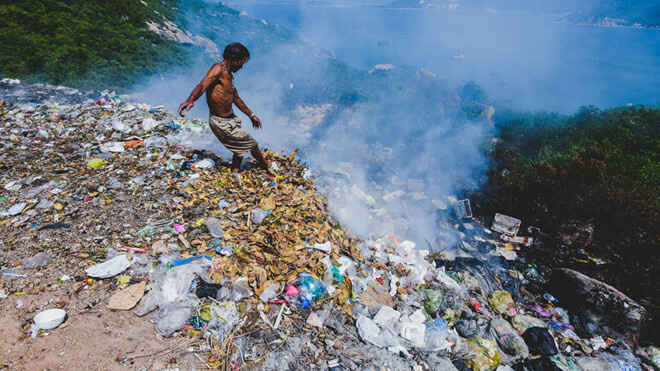Vietnamese per capita plastic waste is the third highest in Southeast Asia after increasing more than 10-fold in the last three decades.

Each Vietnamese person consumed only 3.8 kg of plastic in 1990, but 28 years later this had risen to 41.3 kg, according to a report released on Wednesday by Ipsos Business Consulting.
In Southeast Asia, only Malaysia (75.4 kg) and Thailand (66.4 kg) generate more.
For the study, Ipsos polled more than 17,000 respondents and did 3,900 selective interviews.
Viet Nam's plastic waste discharge is among the highest in the world, it said, without revealing specific ranking.
While more than half (55 percent) of respondents in the country said plastic waste is a serious problem, one third (33 percent) said plastic bottles and food wrap are indispensable in their daily life.
Viet Nam annually produces 1.8 million tons of plastic waste, but only 27 percent is recycled, the report said.
The government has been making increasing efforts to combat the plastic waste epidemic, with Prime Minister Nguyen Xuan Phuc calling for action to achieve zero disposable plastic use in urban shops, markets and supermarkets by 2021 and nationwide by 2025.
The report warned that these targets would not be easy due to poor public awareness of the impacts of plastic waste on the environment and low taxes on plastic products.
It also said Viet Nam is at high risk of becoming the world’s landfill with many countries taking advantage of policy gaps to ship large volumes of plastic waste to the country.
Viet Nam imported 9.2 million tons of scrap last year, up 14 percent from 2017, according to customs data.
The biggest sources of plastic recyclable wastes to Viet Nam are Japan, Hong Kong and Thailand, according to environmental organization Greenpeace.
Quach The Phong, Viet Nam country manager of Ipsos Business Consulting, told VnExpress International that while plastic waste is a headache for Viet Nam, it is not feasible to ban the use of plastics.
"In Viet Nam, there is increasing awareness of limiting plastic use, for example, single-use bags at supermarkets, and replacing plastic straws at cafés with more environmentally-friendly alternatives. But it seems that much more needs to be done on a larger scale to get rid of this deep-rooted habit in the country."